Features
As a student I wrote a quite a few features for Cherwell, one of the student papers, and went on to become Deputy Features Editor there. The article that got the most reaction from my fellow students was entitled "Pleasuring Yourself". I've also written about many other topics that piqued my interest, including 18th Coffee Houses, Toilet Graffiti, and local politics.
Why I wouldn't buy my man a mengagement ring, The Periscope Post, 23 April 2012.
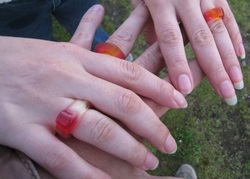
I contemplated proposing to my boyfriend this year (a leap year). I was not the only one.
Yet there was one practical detail that stymied me. I could conjure up a romantic private venue. I could get down on one knee and pop the question, though I would have to be careful in my choice of skirt.
The vexed question was: “What about the ring?” You can’t exactly say “Will you marry me? Oh, and by the way here’s the bill for the ring I bought myself.” Kelly Bowerbank wrote in The Guardian that she and her fiancé wore Haribo rings after her successful proposal. That wouldn’t work for me. I’d eat mine in minutes without thinking. And what kind of symbol would that be for my future marriage?
But now the terrifyingly prolific wedding industry has produced a solution: the “mengagement ring”. I saw this in a wedding magazine recently and thought: “Ugh.” more
Yet there was one practical detail that stymied me. I could conjure up a romantic private venue. I could get down on one knee and pop the question, though I would have to be careful in my choice of skirt.
The vexed question was: “What about the ring?” You can’t exactly say “Will you marry me? Oh, and by the way here’s the bill for the ring I bought myself.” Kelly Bowerbank wrote in The Guardian that she and her fiancé wore Haribo rings after her successful proposal. That wouldn’t work for me. I’d eat mine in minutes without thinking. And what kind of symbol would that be for my future marriage?
But now the terrifyingly prolific wedding industry has produced a solution: the “mengagement ring”. I saw this in a wedding magazine recently and thought: “Ugh.” more
Apathy is Pathetic!, Politick! Magazine, Issue 1, November 2008, pp. 6-8.
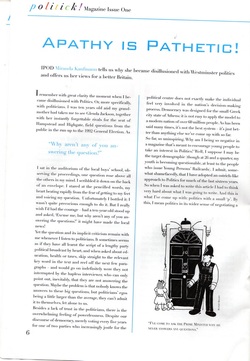
I remember with great clarity the moment when
I became disillusioned with Politics. Or, more specifically, with politicians. I
was ten years old and my grandmother had taken me to see Glenda Jackson,
together with her instantly forgettable rivals for the seat of Hampstead
and Highgate, field questions from the public in the run up to the 1992
General Election. As I sat in the auditorium of the local boys’ school,
observing the proceedings, one question rose above all the others in my
mind. I scribbled it down on the back of an envelope. I stared at the
pencilled words, my heart beating rapidly from the fear of getting to my
feet and voicing my question.
Unfortunately I bottled it: I wasn’t quite precocious enough to do
it. But I really wish I’d had the courage – had a ten-year-old stood up
and asked, ‘Excuse me, but why aren’t any of you answering the
questions?’ it might have made the local news!
Yet the question and its implicit criticism remain with me whenever I listen to politicians. It sometimes seems as if they have all learnt the script of a lengthy party political broadcast by heart, and when asked about education, health or taxes, skip straight to the relevant key word in the text and reel off the next few paragraphs – and would go on indefinitely were they not interrupted by the hapless interviewer, who can only point out, inevitably, that they are not answering the question. Maybe the problem is that nobody knows the answers to these big questions, but politicians’ egos being a little larger than the average, they can’t admit it to themselves, let alone to us. more
Yet the question and its implicit criticism remain with me whenever I listen to politicians. It sometimes seems as if they have all learnt the script of a lengthy party political broadcast by heart, and when asked about education, health or taxes, skip straight to the relevant key word in the text and reel off the next few paragraphs – and would go on indefinitely were they not interrupted by the hapless interviewer, who can only point out, inevitably, that they are not answering the question. Maybe the problem is that nobody knows the answers to these big questions, but politicians’ egos being a little larger than the average, they can’t admit it to themselves, let alone to us. more
A woman’s place...Christ Church Matters, September 2006, pp. 6-7.
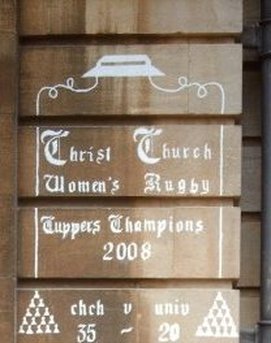
Given that Christ Church was founded over 450 years ago, 25 years of women might not seem particularly significant.
The Upper Library's creative exhibition of women's memorabilia reflected the low level of involvement of women in Christ Church before 1980. For example, a copy of Spenser’s Faerie Queene was on display. Spenser’s poem was dedicated to Queen Elizabeth I, who, as monarch, was the official Visitor of the House. Can Elizabeth I be described as a ‘Woman of Christ Church’? Certainly she and the other Queen Elizabeth are the only women boasting portraits in Hall.
From what Judy Pallot said after dinner, it became clear that the arrival of women at Christ Church was not exactly greeted with delight amongst many members of the House. This feeling was confirmed by some of the stories told by the first year of female entrants. On their first night in college a couple of girls had gone to the bar and ordered two beers. They met with the response: ‘I’m sorry, we don’t serve dogs here.’ This line had apparently been thought up and planned in advance. I find this story shocking on two counts. Not only does it display rudeness and disrespect, but even worse, it displays absolutely no humour, wit or intelligence! At least the other line circulating at the time, ‘A Woman’s Place is in the Home and not the House’,was a decent pun! more
The Upper Library's creative exhibition of women's memorabilia reflected the low level of involvement of women in Christ Church before 1980. For example, a copy of Spenser’s Faerie Queene was on display. Spenser’s poem was dedicated to Queen Elizabeth I, who, as monarch, was the official Visitor of the House. Can Elizabeth I be described as a ‘Woman of Christ Church’? Certainly she and the other Queen Elizabeth are the only women boasting portraits in Hall.
From what Judy Pallot said after dinner, it became clear that the arrival of women at Christ Church was not exactly greeted with delight amongst many members of the House. This feeling was confirmed by some of the stories told by the first year of female entrants. On their first night in college a couple of girls had gone to the bar and ordered two beers. They met with the response: ‘I’m sorry, we don’t serve dogs here.’ This line had apparently been thought up and planned in advance. I find this story shocking on two counts. Not only does it display rudeness and disrespect, but even worse, it displays absolutely no humour, wit or intelligence! At least the other line circulating at the time, ‘A Woman’s Place is in the Home and not the House’,was a decent pun! more
The Ode Less Travelled, Cherwell, 2 June 2006, pp. 10-11.
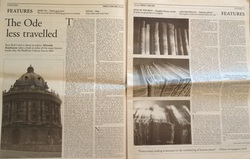
Your Bod Card is about to expire. Miranda Kaufmann takes a look at some of the more bizarre books that the Bodleian Library has to offer.
“Promiscuous reading is necessary to the constituting of human nature”- Milton, Areopagitica, 1644.
That’s it. The problem is that this monogamous relationship you’ve had for maybe as long as the last four years with your subject is finally getting stale. You’re stuck in a rut. It’s making you jump through hoops to prove you still care. If you’ve finished Finals or even Prelims, it’s time to start an open relationship. And until August when your Bod Card expires, you have a ticket to the Best Little Whorehouse in Oxfordshire for pursuing some promiscuous reading: the Bodleian. As you may recall, it’s a copyright library. That means it has copies of everything ever published in this country. And that includes Playboy. Ever typed a subject at random into the OLIS search engine? It comes up with some interesting results.
You may at this stage never want to see another book ever again. And the idea of entering a library voluntarily may seem like madness. But you wouldn’t be here if you didn’t once upon a time enjoy reading for pleasure. One friend of mine, a Somerville engineer, though proud to boast that he hadn’t read a book since he was 16, got almost wistful when describing to me how he loved reading The Way Things Work as a child. Remember- the big Dorling Kindersley volume with the woolly mammoth illustrations? Once you leave Oxford for the ‘real world’, you may not have much time to read. But this summer, you may find a bit of leisure time, perhaps in the afternoons, between brunch and the first garden party of the day (especially if it’s raining) to pick up a book. This is your chance to use the great resource that is the Bodleian for your own ends. Some of the volumes stored in the cellars under Broad Street do not exist anywhere else in the world, and you certainly won’t have such easy access to them ever again. more
“Promiscuous reading is necessary to the constituting of human nature”- Milton, Areopagitica, 1644.
That’s it. The problem is that this monogamous relationship you’ve had for maybe as long as the last four years with your subject is finally getting stale. You’re stuck in a rut. It’s making you jump through hoops to prove you still care. If you’ve finished Finals or even Prelims, it’s time to start an open relationship. And until August when your Bod Card expires, you have a ticket to the Best Little Whorehouse in Oxfordshire for pursuing some promiscuous reading: the Bodleian. As you may recall, it’s a copyright library. That means it has copies of everything ever published in this country. And that includes Playboy. Ever typed a subject at random into the OLIS search engine? It comes up with some interesting results.
You may at this stage never want to see another book ever again. And the idea of entering a library voluntarily may seem like madness. But you wouldn’t be here if you didn’t once upon a time enjoy reading for pleasure. One friend of mine, a Somerville engineer, though proud to boast that he hadn’t read a book since he was 16, got almost wistful when describing to me how he loved reading The Way Things Work as a child. Remember- the big Dorling Kindersley volume with the woolly mammoth illustrations? Once you leave Oxford for the ‘real world’, you may not have much time to read. But this summer, you may find a bit of leisure time, perhaps in the afternoons, between brunch and the first garden party of the day (especially if it’s raining) to pick up a book. This is your chance to use the great resource that is the Bodleian for your own ends. Some of the volumes stored in the cellars under Broad Street do not exist anywhere else in the world, and you certainly won’t have such easy access to them ever again. more
Explained: Marriage, Cherwell, June 2005.

In 1754 Lord Hardwicke’s Marriage Act was passed to prevent ‘both men and women of the most infamous character’ from ‘ruining the sons and daughters of the greatest families in England’. Due to ‘the convenience of marrying in the Fleet and other unlicensed places…marrying had become as much a trade as any mechanical profession’. A fortune could easily be made by marrying an heir or heiress.
It seems that early 18th century London was not unlike modern Las Vegas in its provision of quick and easy marriage, no questions asked. It was reported that ‘there’s such a coupling at Pancras that they stand behind one another as ‘twere in a country dance’ . Fleet Street flocked with touts asking ‘Sir, will you be pleased to walk in and be married?’. Unscrupulous clerics would happily backdate papers to legitimise children, or even supply a man for a woman needing a husband in a hurry- for a fee. Captain Basil in Farrquhar’s The Stage Coach recounts how one particularly accommodating parson, whom he and his wife-to-be found in his chamber, smoking his pipe, ‘first gave us his blessing, then lent us his bed’. more
It seems that early 18th century London was not unlike modern Las Vegas in its provision of quick and easy marriage, no questions asked. It was reported that ‘there’s such a coupling at Pancras that they stand behind one another as ‘twere in a country dance’ . Fleet Street flocked with touts asking ‘Sir, will you be pleased to walk in and be married?’. Unscrupulous clerics would happily backdate papers to legitimise children, or even supply a man for a woman needing a husband in a hurry- for a fee. Captain Basil in Farrquhar’s The Stage Coach recounts how one particularly accommodating parson, whom he and his wife-to-be found in his chamber, smoking his pipe, ‘first gave us his blessing, then lent us his bed’. more
Fools, Squires and Bagmen, Cherwell, 22 April 2005, p. 13.
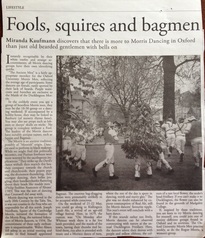
Miranda Kaufmann discovers that there is more to Morris Dancing in Oxford than just old bearded gentlemen with bells on
Instantly recognisable by their white outfits and strange accoutrements, all Morris dancing groups have their own identifying quirks.
“The Ancient Men” is a fairly appropriate moniker for the Oxford University Morris Men, reflecting the average age of participants. Some dancers are female, easily spotted by their lack of beards. Purple waistcoats and breeches are exclusive to the Maids of the Ducklington Morris. In the unlikely event you spy a group of beardless Morris men, they may be the 18-30 group on a dancing weekend. If accompanied by a hobby-horse, they may be linked to Banbury (of nursery rhyme fame). You may also see props such as lobsters or sheeps’ skulls on sticks. No group is complete without a Fool. The leaders of the Morris dancers have suitably antique names, such as Squire and Bagman.
The Morris is an ancient tradition, possibly of “Moorish” origin. Dancers used to perform in black makeup. While we might find this politically incorrect, our Puritan forebears were more worried by the sacrilegeous implications: “They strike up the Devil’s dance withall: then martch this heathen company towards the church and churchyards, their pypers pyping, the drummers thundering, their stumpes dancing, their belles jyngling, their handkercheefes fluttering about their heads like madde men.” (Philip Stubbes ‘Anatomie of Abuses’ 1583) This was the sort of dancing that Cromwell did away with. more
Instantly recognisable by their white outfits and strange accoutrements, all Morris dancing groups have their own identifying quirks.
“The Ancient Men” is a fairly appropriate moniker for the Oxford University Morris Men, reflecting the average age of participants. Some dancers are female, easily spotted by their lack of beards. Purple waistcoats and breeches are exclusive to the Maids of the Ducklington Morris. In the unlikely event you spy a group of beardless Morris men, they may be the 18-30 group on a dancing weekend. If accompanied by a hobby-horse, they may be linked to Banbury (of nursery rhyme fame). You may also see props such as lobsters or sheeps’ skulls on sticks. No group is complete without a Fool. The leaders of the Morris dancers have suitably antique names, such as Squire and Bagman.
The Morris is an ancient tradition, possibly of “Moorish” origin. Dancers used to perform in black makeup. While we might find this politically incorrect, our Puritan forebears were more worried by the sacrilegeous implications: “They strike up the Devil’s dance withall: then martch this heathen company towards the church and churchyards, their pypers pyping, the drummers thundering, their stumpes dancing, their belles jyngling, their handkercheefes fluttering about their heads like madde men.” (Philip Stubbes ‘Anatomie of Abuses’ 1583) This was the sort of dancing that Cromwell did away with. more
Love Me Do, Cherwell, 13 February 2004, p. 12-13.
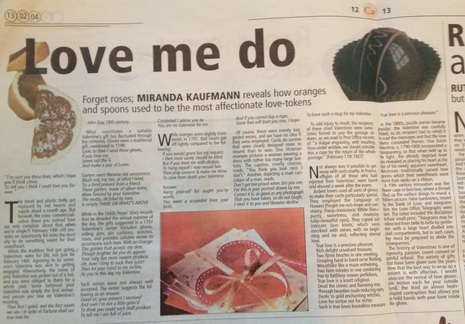
Forget roses; Miranda Kaufmann reveals how oranges and spoons used to be the most affectionate love tokens
“I’ve sent you these lines, which I hope you think clever,
To tell you I think I could love you forever.”
The tinsel and plastic holly got replaced by red hearts and cupids about a month ago. But beneath the crass commercialisation (have you noticed how we only complain about that when we’re single?) February 14th still provides an opportunity for even the most shy to do something sweet for their sweetheart.
When the tradition first got going, Valentines were for life, not just for February 14th. Agreeing to be someone’s Valentine was akin to getting engaged. Alternatively, the name of your Valentine was picked out of a hat and you were obliged to them for a whole year. Some believed your Valentine was simply the first unmarried person you saw on Valentine’s morning. more
“I’ve sent you these lines, which I hope you think clever,
To tell you I think I could love you forever.”
The tinsel and plastic holly got replaced by red hearts and cupids about a month ago. But beneath the crass commercialisation (have you noticed how we only complain about that when we’re single?) February 14th still provides an opportunity for even the most shy to do something sweet for their sweetheart.
When the tradition first got going, Valentines were for life, not just for February 14th. Agreeing to be someone’s Valentine was akin to getting engaged. Alternatively, the name of your Valentine was picked out of a hat and you were obliged to them for a whole year. Some believed your Valentine was simply the first unmarried person you saw on Valentine’s morning. more
Legally bland?, Cherwell, 23 January 2004, p. 12.
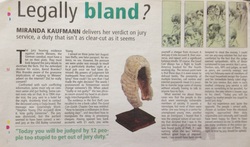
Miranda Kaufmann delivers her verdict on jury service, a duty that isn’t as clear cut as it seems
The jury hearing evidence against Armin Meiwes, the German cannibal, must have a lot on their plate. They must look beyond the juicy details to ascertain the facts. Did the defendant deceive his victim, Berndt Brandes? Was Brandes aware of the gruesome implications of replying to Meiwes’s advert on the internet? Did he really consent?
Confronted with such conflicting information, juries must rely on common sense and gut feeling. Some cannot on even rely on that. In a 1994 murder trial, the jury, sent to a hotel for the night, drunkenly tried to contact the deceased using a Ouija board. The message was surprisingly blunt: “Stefan Young (the accused) done it. Vote guilty tomorrow.” The jury was dismissed, but the portents seemed to have been correct. A second jury at the Old Bailey convicted Young.
I served on three juries last August: two thefts; one false passport. No violence, no sex. However, the pressure we were under was enough to result in a particularly drunken night at a local pub once we had been dismissed. My powers of judgement felt inadequate. How could I tell who was lying? How could I be sure that I had made the right decision? The words I pronounced as forewoman would change someone’s life. When asked: “Guilty or Not Guilty?” the two phrases swum around my head in an alarmingly interchangeable fashion. more
The jury hearing evidence against Armin Meiwes, the German cannibal, must have a lot on their plate. They must look beyond the juicy details to ascertain the facts. Did the defendant deceive his victim, Berndt Brandes? Was Brandes aware of the gruesome implications of replying to Meiwes’s advert on the internet? Did he really consent?
Confronted with such conflicting information, juries must rely on common sense and gut feeling. Some cannot on even rely on that. In a 1994 murder trial, the jury, sent to a hotel for the night, drunkenly tried to contact the deceased using a Ouija board. The message was surprisingly blunt: “Stefan Young (the accused) done it. Vote guilty tomorrow.” The jury was dismissed, but the portents seemed to have been correct. A second jury at the Old Bailey convicted Young.
I served on three juries last August: two thefts; one false passport. No violence, no sex. However, the pressure we were under was enough to result in a particularly drunken night at a local pub once we had been dismissed. My powers of judgement felt inadequate. How could I tell who was lying? How could I be sure that I had made the right decision? The words I pronounced as forewoman would change someone’s life. When asked: “Guilty or Not Guilty?” the two phrases swum around my head in an alarmingly interchangeable fashion. more
Pleasuring Yourself… Cherwell, 8 October 2003, pp. 12-13.
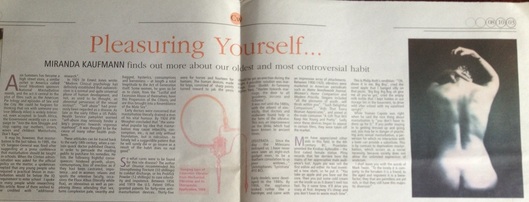
Miranda Kaufmann finds out more about our oldest and most controversial habit
Ann Summers has become a high street store, a similar outlet in America called Good Vibrations sponsors National Masturbation month, and the act is central to the plot of films such as the American Pie trilogy and episodes of Sex and the City. We could be forgiven for thinking that sex with someone you love (Woody Allen) is widely tolerated, even accepted.
In South Africa, the Government recently ran a campaign to “Join the Arm Struggle and stop raping our mothers, sisters, wives and children: Masturbate, Don’t Rape”. It may be, however, that masturbation is the last taboo. In 1995, the US Surgeon-General was fired after suggesting at a press conference that masturbation should be taught in schools. When the Clinton administration was asked for the official policy on the matter, a spokesman replied that any young people who required a practical lesson in masturbation would be below the IQ requirement to enter school. I spoke to many people while researching this article. None of them wished to be credited with “additional research”. more
Ann Summers has become a high street store, a similar outlet in America called Good Vibrations sponsors National Masturbation month, and the act is central to the plot of films such as the American Pie trilogy and episodes of Sex and the City. We could be forgiven for thinking that sex with someone you love (Woody Allen) is widely tolerated, even accepted.
In South Africa, the Government recently ran a campaign to “Join the Arm Struggle and stop raping our mothers, sisters, wives and children: Masturbate, Don’t Rape”. It may be, however, that masturbation is the last taboo. In 1995, the US Surgeon-General was fired after suggesting at a press conference that masturbation should be taught in schools. When the Clinton administration was asked for the official policy on the matter, a spokesman replied that any young people who required a practical lesson in masturbation would be below the IQ requirement to enter school. I spoke to many people while researching this article. None of them wished to be credited with “additional research”. more
Changing the way we think, Cherwell, 24 October 2003, p. 11.
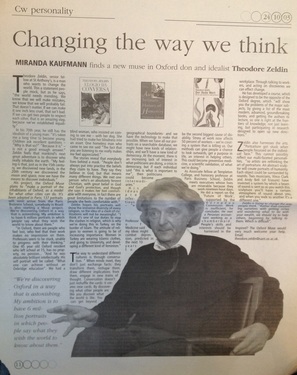
Miranda Kaufmann finds a new muse in Oxford don and idealist Theodore Zeldin
Theodore Zeldin, senior fellow at St. Anthony’s, is a man who wants to change the world. This is a statement people mock, but as he says: “The world needs mending. We know that we will make mistakes, we know that we will probably fail. That doesn’t matter. If we can make it one inch less cruel, that isn’t bad. If we can get two people to respect each other, that is an amazing step, because we’ve established equality.”
In his 70th year, he still has the idealism of a young man: “It’s taken me a long time to become young. Children ask excellent questions –'Why is that so?' 'Because it is'- is not a good enough answer.” Zeldin feels that mankind’s next great adventure is to discover who really inhabits the earth. “My feeling is that, just as in the 15th century we discovered new lands, in the 20th century we discovered the moon and space, now we have the means to discover individuals.”
His project, the Oxford Muse, plans to “make a portrait of the inhabitants of Oxford, as a model for what other cities can do. It’s been adopted in Paris; 137 portraits will soon arrive from the Paris Business School, somebody in Brazil is also starting a Muse project. We’re discovering Oxford in a way that is astonishing. My ambition is to have 6 million portraits in which people say what they wish the world to know about them.” more
Theodore Zeldin, senior fellow at St. Anthony’s, is a man who wants to change the world. This is a statement people mock, but as he says: “The world needs mending. We know that we will make mistakes, we know that we will probably fail. That doesn’t matter. If we can make it one inch less cruel, that isn’t bad. If we can get two people to respect each other, that is an amazing step, because we’ve established equality.”
In his 70th year, he still has the idealism of a young man: “It’s taken me a long time to become young. Children ask excellent questions –'Why is that so?' 'Because it is'- is not a good enough answer.” Zeldin feels that mankind’s next great adventure is to discover who really inhabits the earth. “My feeling is that, just as in the 15th century we discovered new lands, in the 20th century we discovered the moon and space, now we have the means to discover individuals.”
His project, the Oxford Muse, plans to “make a portrait of the inhabitants of Oxford, as a model for what other cities can do. It’s been adopted in Paris; 137 portraits will soon arrive from the Paris Business School, somebody in Brazil is also starting a Muse project. We’re discovering Oxford in a way that is astonishing. My ambition is to have 6 million portraits in which people say what they wish the world to know about them.” more
Coffee Culture Began in Britain, The Owl Journal, June 2003, pp. 14-16.

The website WeLoveTheIraqiInformationMinister.com is currently selling coffee mugs with the slogan: “No American will ever pour coffee in this mug. Never!” Interviewed by the BBC, the website’s founder added: “And for our British customers, we hope to have ‘No British man will ever pour tea in this mug. Never!’ tea mugs available soon!”It is often forgotten that, although by the mid-20th century Englishmen were consuming about 5 times as many pounds of tea as coffee while Americans were consuming about 25 times as many pounds of coffee as tea, the English were really the world’s first coffee nation. Indeed, Macaulay in his History of England wrote that “Foreigners remarked that the coffee-house was that which especially distinguished London from all other cities…that the coffee-house was the Londoner’s home, and that those who wished to find a gentleman commonly asked not whether he lived in Fleet Street or Chancery Lane, but whether he frequented the Grecian or the Rainbow.”The very first coffee house in England opened in Oxford in 1650. Shortly afterward, in 1652, London’s first coffee house opened in St Michael’s Alley, Cornhill. The new drink soon became extremely popular, and by 1663 there were 82 coffee houses in London. By 1739 the number had risen to 551.
But these first coffee houses bore little resemblance to the uniform, sanitised, Mochaccino-selling establishments that now crowd our high-streets. more
But these first coffee houses bore little resemblance to the uniform, sanitised, Mochaccino-selling establishments that now crowd our high-streets. more
Toilet Humour, Cherwell, 16 May 2003, p. 9.
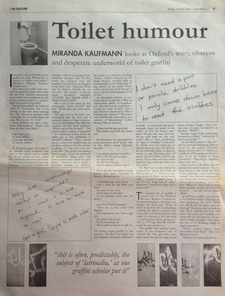
MIRANDA KAUFMANN looks at Oxford's witty, obscene and desperate underworld of toilet graffiti
"I love that even at Oxford people graffiti the walls. Perhaps this is worthy of further exploration?” (Bodleian Women Readers’ Cloakroom.)
This throwaway toilet wall comment became my mission this week. Do the Bod readers, supposedly some of the most intelligent people in the country, produce a uniquely high flown genre of graffiti? One girl in the Rad Cam seems to think so:
“Goodness, this is the writing on the wall. How exciting! But what educated, sarcastic little comments.
Let me bring down the tone. TK woz ere. 27/1/02”
These scribbles are often a welcome entertainment. There’s this from the Rad Cam Men’s:
" I don’t need a poo/ Or penile dribbles,/ I only come down here/ To read the scribbles."
An American paper on Graffiti in the Athenian Agora concludes that “one of the earliest uses to which the art of writing was put, along with alphabetic exercises and marks of ownership was sexual insult and obscenity.” E.g: Festus hic fuituit cum Sodalibus – Here Festus made it with Sodalibus. (Pompeii AD 79) Not much has changed. more
"I love that even at Oxford people graffiti the walls. Perhaps this is worthy of further exploration?” (Bodleian Women Readers’ Cloakroom.)
This throwaway toilet wall comment became my mission this week. Do the Bod readers, supposedly some of the most intelligent people in the country, produce a uniquely high flown genre of graffiti? One girl in the Rad Cam seems to think so:
“Goodness, this is the writing on the wall. How exciting! But what educated, sarcastic little comments.
Let me bring down the tone. TK woz ere. 27/1/02”
These scribbles are often a welcome entertainment. There’s this from the Rad Cam Men’s:
" I don’t need a poo/ Or penile dribbles,/ I only come down here/ To read the scribbles."
An American paper on Graffiti in the Athenian Agora concludes that “one of the earliest uses to which the art of writing was put, along with alphabetic exercises and marks of ownership was sexual insult and obscenity.” E.g: Festus hic fuituit cum Sodalibus – Here Festus made it with Sodalibus. (Pompeii AD 79) Not much has changed. more
